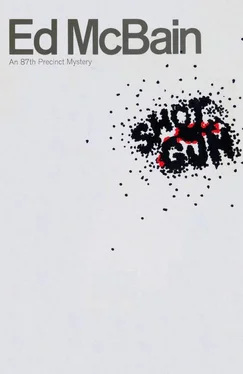“Someone viciously opened her seams.”
The reading continued in a similar vein for the remainder of the morning. Unlike the assorted poets who read their wares, the audience seemed composed of people who could hardly be classed as hippies. A spot check of the crowd turned up neighborhood faces familiar to Hawes and Meyer alike; merchants, housewives, professional men, even a patrolman from their own precinct, sitting attentively in his off-duty clothes. The idea, of course, was not to glom the audience, but rather to take a bead on “ten of Margie’s closest friends,” any of whom might have done the dear girl in.
Discounting the mystery man who had met Margie in Perry’s Bar & Grille on DeBeck Avenue, and who had later returned in desperate need of her name, discounting him as a prime suspect because there were too many ifs involved (if he had finally remembered her name, and if he had gone to her apartment, and if she had let him in at that hour of the morning), there remained the likelihood that the person who had stabbed Margie was indeed one of her good friends, someone who could have been with her in her apartment at four or later in the morning. So Meyer and Hawes sat through two hours and ten minutes of bad poetry (including some lines attributed to Marguerite Ryder herself) while pretending they were at a police lineup instead, an entertainment now defunct but not missed in the slightest by either of the men.
The parade of poets was colorful but hardly instructive. Meyer and Hawes went backstage after the reading to talk to the ten budding versifiers, as well as to the guitarist Garzon. They learned to their surprise that there had been a party at Garzon’s house on the night Margie was murdered, with “mos’ of the kids” (as Garzon put it) having been in attendance.
“Was Margie Ryder there?” Hawes asked.
“Oh, yes,” Garzon said.
“What time did she leave?”
“She only stay a shor’ while.”
“How long?”
“She arrive abou’ ten o’clock, and she leave it mus’ have been close to mi’night.”
“Alone?”
“Perdone?”
“Did she leave the party alone?”
“Ah, sí, sí. Solo. Alone.”
“Was she with anyone in particular while she was there?”
“No, she drift aroun’, comprende? It was like a big party, you know? So she stop here, she stop there, she drink, she laugh, she was muy sociable, Margie, you know? Everybody like her.”
Which did not explain why anybody would want to kill her.
Meyer and Hawes thanked everybody and went out into the street to breathe some fresh November prose.
Steve Carella was supposed to take down the screens, but he decided to visit the Leyden apartment instead, which is how he happened to get hit on the head. Of course, he might have got hit on the head while taking down the screens too, but in police work there is a clear line between possibility and probability, and chances were a good sixty-to-one that he would not have been nursing a bump on his noggin that night if he had taken care of his household duties that afternoon, instead of running into the city to snoop around an empty apartment.
The reason he went back to the apartment was not, as Teddy had surmised, to get out of taking down the screens. (True, he did not enjoy taking down the screens, but neither did he enjoy putting them up, and he enjoyed getting hit on the head perhaps even less than either.) He had discovered through years of police work that very often you can’t see the forest for the trees, which is a fresh and imaginative way of saying that sometimes you have to step back for a long view, or closer for a tight view, in order to regain your perspective on a case.
In Carella’s thinking, a murder invariably served as the impetus that set in action a proscribed police routine. Often, in slogging through reports typed in triplicate, in deciphering the medical gobbledygook on an autopsy return, in tailing a suspect or interrogating a witness, in poring over questioned documents or ballistics data, it was completely possible to forget exactly why you were doing all these things, forget that it was indeed a corpse that had prompted this machinery into motion. When that happened, he found it advisable to return to the scene, and imagine for himself the details of what might have happened during the actual commission of the crime.
Also, he hated taking down screens.
The elevator sped him to the third floor. It was a self-service elevator, and the killer could have used it with immunity at any hour of the day or night — but had he? Would he have risked being seen by, say, a pair of tenants returning home from a late party? Or would he have more realistically used the stairway that opened directly onto the apartment’s service entrance? After all, the kitchen door had been found open by Novello, the milkman. Wasn’t it likely that the killer had entered and left by the same door? Standing in the corridor, Carella looked at the closed front door to Mrs. Leibowitz’s apartment, heard behind it the singing of her colored maid, and then walked down the hall to the Pimm apartment. He listened at the door. The apartment within was still.
He went back up the hallway again to the Leyden apartment, decided to enter instead by the service entrance, and walked to the small cul-de-sac at the end of the corridor. The garbage cans for all three apartments were stacked on the small landing there. The back doors to the Leibowitz and Pimm apartments were on one side of the landing, the back door to the Leyden apartment opposite them. Without trying to figure out what was obviously a complicated architectural scheme, Carella reached into his side pocket for the key he had signed out downtown at the Office of the Clerk yesterday (premeditation, Teddy would claim, you knew you weren’t going to take down those screens today) and approached the Leydens’ kitchen door. He had a little trouble turning the key in the lock (should be using my goddamn skeleton, he thought) but finally managed to twist it and open the door. He had a bit more trouble extricating the key, yanked it loose at last, put it back into his side pocket, and closed the door behind him.
The apartment was silent.
This is where the killer must have stood, he thought. He must have entered through this door, and hesitated for a moment in the kitchen, trying to determine where his victims were. Rose Leyden had doubtless heard something and come into the living room to investigate, and that was when he’d fired the two shots that had taken off her face.
Carella moved into the living room.
The rug was still stained, the blood having dried to a muddy brown color. He looked down at the huge smear where Rose Leyden’s head had rested, and then glanced toward the bedroom. Andrew Leyden had probably been asleep, exhausted after his long trip home, shocked into wakefulness by the two shots that had killed his wife. He had most likely jumped out of bed, perhaps yelling his wife’s name (was that the shouting one of the tenants had reported hearing?) and started for the living room only to be met by the killer in the bedroom doorway.
Carella nodded, and walked across the room.
The killer probably stopped right here, he thought, firing into Leyden’s face, you have to hate somebody a hell of a lot to fire a shotgun at point-blank range into his face. Twice. Carella took a step into the bedroom. He saw that the top drawer of the dresser was open, and he recalled instantly that it had not been open on the morning after the murders, and he wondered whether the lab boys had left it that way, and he was starting toward the dresser to investigate when somebody came from behind the door and hit him on the head.
Читать дальше












